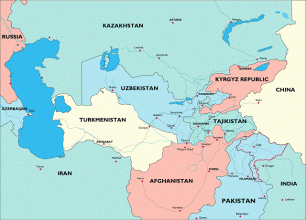On December 28th, 2012, Arielle Thedrel published in the French newspaper Le Figaro an article entitled Une Guerre de l’Eau Menace l’Asie Centrale, alluding to the uneasy situation of water-management in Central Asia, at the several occasions of (past and future) confrontation and at the political acrimony among the former Soviet republics of Central Asia. For the purpose of clarity, by Central Asia here is meant as formed by Kazakhstan, Kyrgyzstan, Tajikistan, Turkmenistan and Uzbekistan. There is indeed a lot of talk about “water wars” in Central Asia, about a possible collapse of the region, about the likely unravelling of the stability of the area due to clashes over hydro resources.
To me, what we observe in Central Asia is more a confrontation than a war in perspective, a confrontation kept as such by diplomatic efforts made by the state leaders, by the role of international organisations, by the systemic and prospective danger of Afghanistan spilling over and by the presence of Russia, albeit weaker than in the past. There is acrimony, there is conflict, but there are also attempts to scale down risky behaviours, sharp statements and disruptive actions. While weak and perhaps superficial, these attempts should be considered in a thorough analysis of water problems in Central Asia from a political-diplomatic perspective. What I am suggesting, therefore, is not foolish or naïve optimism, but a more thorough and less emotional assessment of the overall regional balance of interests in the region. A proof of this is that a water war in Central Asia has been claimed for at least ten years if not more, and still these states not only have avoided it, but have been able to reach a legal agreement as that of 2008, then abandoned. The hope for the future, therefore, is not that war will be avoided, but rather that these diplomatic and political stalemates will develop in concrete action to make water management in the region better in the interest of all parts concerned. More…


